


English Translations of Cubans Writing From the Island






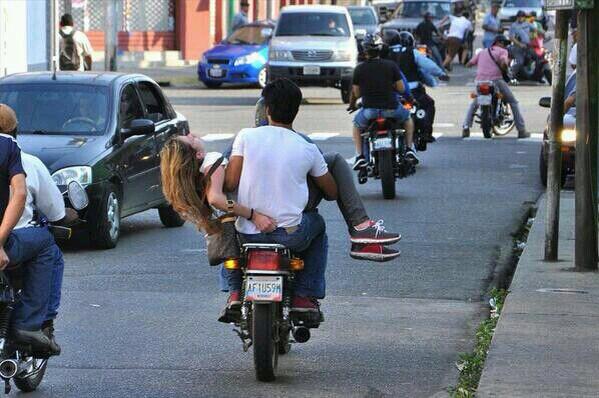
They say no one learns a lesson through someone else’s head, that we repeat the mistakes of others and stumble, over and over, on the same stone. Skeptics assure us that people forget, close their eyes to the past and commit identical mistakes. Venezuela, however, has begun to disprove that inevitability. Amid a reality marked by insecurity, shortages and inflation, Venezuelans are trying to amend a mistake that has lasted too long.
Taken over by Cuban intelligence, monitored from the Plaza of the Revolution in Havana, and ruled by a man who incites violence against those who are different, this South American nation now finds itself facing the most important dilemma of its contemporary history. Totalitarianism or democracy, those are the options. What is being decided in its streets is not only Nicolás Maduro’s permanence in power, but the very existence of an axis of authoritarianism and personal ambition that spans all of Latin America. A system that disguises itself with empty words in the style of “socialism of the 21st century,” “a revolution of the humble,” “the dreams of Simon Bolívar” and “the new left,” whose fundamental characteristics are its leaders’ lust for power, economic inefficiency, and the curtailing of freedoms.
But Venezuelan students have given Chavismo a dose of its own medicine. Young people and college students have been the driving force of the protests this time. Which proves that Miraflores has lost the most rebellious and dynamic part of society. Although the headlines in the government controlled press speak of conspiracies fomented from abroad, it’s enough to look at the images of the police and the armed commandos beating the protestors to understand where the violence comes from.
Venezuela is going through difficult times, like all awakenings. The oligarchs in red will not give up power voluntarily and Raul Castro will not let them so easily snatch away the goose that lays the golden egg. But at least we already know that Venezuelans will not walk the same road they imposed on us in Cuba. Meekness, fear, complicity, and escape as the only way out… those have been our mistakes. Venezuela doesn’t want to repeat them, it can’t repeat them.
2 March 2014
On the 27th, after serving his sentence, one of the “Cuban Five” spies was released and subsequently deported to Cuba. For several days, the official press and the authorities have launched a media circus, which starting today will grow. There are only three now serving sentences in U.S. prisons. I am sure, however, the manipulative media campaign will continue to talk about five. They have a lot invested in it and it would be like renaming an already known product.
This, ultimately, is nothing more than a publicity campaign like any other. In addition, it’s always cost the Cuban authorities time and work to react to reality. If once, many years ago, they were considered revolutionary, for decades now they have been profoundly reactionary.
It seems that time doesn’t pass in vain, and the old men of today find it hard to change something, fearing they will lose everything. It’s understandable: age no longer allows them to start over.
The issue of the spies, rather than an act of humanism, is a way to entertain a part of the population, so they forget their everyday problems, and to make some sense of the absurd protests and demands of the “government’s friends” abroad, which also assures paying tourists for the Cuban people, and feeling like they star in something, the more to the left the better, to be different to most.
There’s someone else who, I’m sure, contrary to their natural feelings, would prefer for the situation to continue, so that they don’t lose their “little goodies,” which they’ve been enjoying for years: their families. From ordinary unknown citizens, by the work and grace of the authorities, they have become public figures, who travel, dress well, give lectures, participate in events, receive awards, and who have resolved their problems of housing, transport, food and clothing, all at the expense of our pockets, because their “merits” shine by their absence, a non-being who on a new scale of values, is considered a “merit” to be a family member of a confessed spy.
These are some of the absurdities that persist in Cuba and that have disrupted our society, making the young and not so young people prefer to emigrate, and the old, condemned to their misfortune, dream of better days in the years they have left to live.
1 March 2014
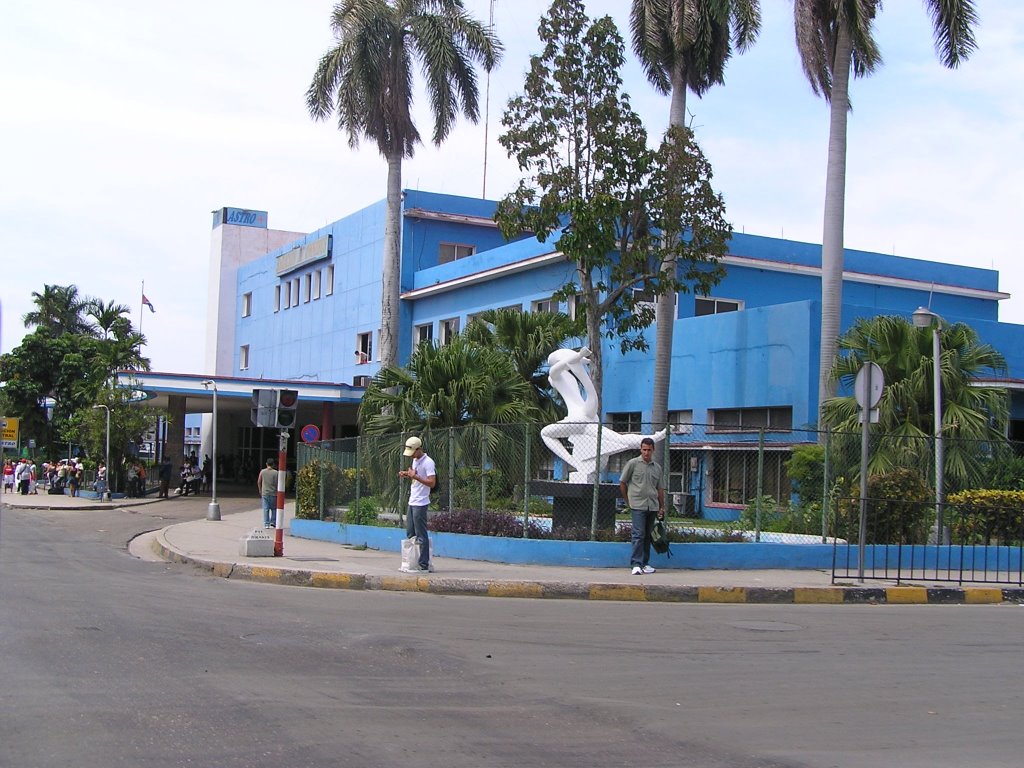 A part of the roof of the newly repaired National Bus Terminal Havana collapsed, causing severe injuries to two young people who were awaiting the arrival of relatives from the Camagüey Province.
A part of the roof of the newly repaired National Bus Terminal Havana collapsed, causing severe injuries to two young people who were awaiting the arrival of relatives from the Camagüey Province.
The young people (Dayana Tejeda and Yisel Gonzalez, 23 and 25, respectively) commented that in the place where the collapse occurred there was no warning or sign of possible danger, on the contrary, was seen as a place recently remodeled. When I say, although they repair it, and repair it again… again … it falls it falls.
28 February 2014
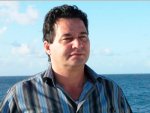 The blogger Angel Santiesteban Prats now has completed one year in prison.
The blogger Angel Santiesteban Prats now has completed one year in prison.
It’s been one year today since Ángel Santiesteban Prats was detained in prison. The writer and netizen is the author of an informative blog, The Children Nobody Wanted, created in 2008, known for its open criticism of the government. On December 8, 2012, after an arbitrary and hasty trial, the Prosecutor declared Angel Santiesteban Prats guilty of the charges against him. Officially, he was condemned to five years in prison for “home violation and injuries,” in spite of the fact that no tangible proof existed. Thus, the blogger was transferred April 9, 2013 to Prison 1850 in San Miguel del Padrón (Havana), where on repeated occasions he suffered mistreatment and torture.
On February 18, 2014, Reporters without Borders learned that the National Association of Law Offices (ONBC) suspended his lawyer, Amelia Rodríguez Cala, so that she cannot practice in the courts for a period of six months. This considerably affects her efforts to have the journalist released. The lawyer is also in charge of the defense of two other dissidents, the musician Gorki Aguila, and Sonia Garro, a member of the Ladies in White, a peaceful protest movement made up of the wives and family members of the political prisoners, which in 2005 received the Sakharov Prize for Freedom of Conscience.
“A year ago Reporters without Borders denounced these cruel and draconian practices. We urge the Cuban authorities to drop all charges against Ángel Santiesteban Prats and request that the journalist be released immediately,” said Lucie Morillon, Director of Investigations of the organization. continue reading
“The intimidation to which journalists are constantly subjected in Cuba is extremely worrying. Cuba occupies last place in the Americas in the World Classification of Freedom of the Press in 2014. It’s in place 170, out of 180 countries,” Lucie Morillon explained.
Although Ángel Santiesteban Prats is the only blogger currently serving a sentence in prison, the authorities continue harassing all the journalists who contradict the official propaganda. The correspondents from independent Cuban websites like Hablemos Press are frequently detained arbitrarily. Hours later they are freed. Other victims of this method are the journalist William Cacer Diaz, on February 14, as well as at least six other news providers: Magaly Novis Otero, Pablo Morales Marchán, Ignacio Luis González Vidal, Denis Noa Martínez and Tamara Rodríguez Quesada, in January 2014.
Ángel Santiestaban-Prats, who today sent an open letter to Raúl Castro, is listed in the Barometer of Press Freedom, as is José Antonio Torres, a correspondent in Santiago de Cuba for the official daily, Granma, imprisoned since May 1, 2011.
Published in Reporteros sin Fronteras (Reporters without Borders)
Translated by Regina Anavy
28 February 2014
Mr. Ruler:
On February 28 I completed one year of unjust imprisonment, after a trial where I demonstrated my innocence with multiple proofs and witnesses. In exchange, the Prosecutor couldn’t present one single consistent proof against me, except the malicious – in addition to being ridiculous – one of an expert calligrapher who, after having ordered me to copy an economic article from the newspaper Granma, the Official Organ of the Communist Party, gave an opinion that the height and slant of my handwriting showed I was guilty.
All this happened four years after the supposed event, where they saddled me with a crime that I didn’t commit. To make things worse, this whole circus that went down against me was corroborated by the henchman Camilo, an official of State Security, long before the Court passed sentence.
Being detained – after a demonstration of support by other compatriots in opposition – this official announced to me before witnesses that I “would be sentenced to five years of privation of liberty,” a declaration that he published on the Internet, one month before the official pronouncement of the Court, an organ that should be impartial, should act independently, but that in addition to clearly following the rulings of State Security, perpetrated another flagrant violation during the judicial trial, upon adding to my penalty one more year than the maximum established by the Penal Code.
My case, like many others, shows that after the coming to power of your family, the Castros, there isn’t even a minimum of independence among the legislative, executive and judicial powers, which exists in all nations that are truly democratic.
These powers are managed by you at your whim and convenience. And history shows that when these powers are manipulated by the same entity, whatever the ideology, we are dealing with a dictatorship, where the only thing left to us is the possibility of interrupting and having influence with our opinions in the fourth power: communication, the news, achieved thanks to the development of the Internet, and to thereby circumvent your iron control on the media. And for that I have been punished. continue reading
Since my incarceration I have been physically and psychologically tortured; on several occasions I have suffered cold in the concrete beds of your cells, beatings from your henchmen, and I have rejected all your proposals that I abandon the national territory or desist from my ideals of freedom for my country.
I want to remind you that before opening my blog, The Children Nobody Wanted, where I only said what I thought about the terrible circumstances of the lives of my people, I was an exemplary citizen who, thanks to the literary talent that God gave me, won prizes and recognition from national and international cultural institutions.
But, General, one day I discovered that the ethical price I was paying to be seen as an exemplary citizen for the totalitarian society that your family has imposed on Cubans was too high for my soul and my time in history. I had to overcome the fear of repression with which the institutions of indoctrination created by your family educated me from my birth.
I decided to overcome the fear implanted by you in the generations of Cubans who have grown up under this failure that you call “Revolution,” and, in particular, the muzzle on the conscience of the artists who mainly pretend to support the socialist process that you command, but later are heard criticizing the Regime under their breath, because, apparently, the Cuban people have preferred to take the easiest, but the longest, road.
This reality of social pretense became for me an insupportable moral burden. I didn’t want to continue doing what they were doing – and still do – this large part of the Cuban generations who have been educated under the law of the cynicism of survival, pretending what they don’t feel.
My conscience lead me to open my blog, The Children Nobody Wanted, and beginning with this event, I signed my death sentence, as your repressors have told me on several occasions.
Expressing a critical opinion as a citizen about the social process that you lead is the only “crime” I have committed, and I accept it.
From this moment I have been prohibited from traveling abroad. They have marginalized me from all national cultural activity, and as a very important detail, just after writing you my First Open Letter, a judicial farce began against me for a crime I supposedly committed four and a half years ago.
Doesn’t this seem like a suspicious coincidence?
Now, one year later, I write you this Second Open Letter, running the risk of unleashing even more your cruelty against me, and even, at the risk of losing my life – although it would be so easy for you to accomplish that, only a snap of your fingers and it would happen.
I urge you to do it, by any of the methods you have applied in more than fifty years of dictatorship against many of those who have opposed your plans: a suspicious terminal illness, an assassination because of a supposed brawl with a common prisoner, or an accidental fall, to cite examples.
Your masters, the Russian KGB and the East German STASI, have taught your stooges well in how to eliminate “enemies” while leaving their guilt on the terrain of speculation.
I assure you, luckily for me, that what I was born to do in this life has already been accomplished, because my ambitions are small. This helped me to decide to change my status, my literary future, what some call “to boycott my fate,” since to sacrifice the well-being and happiness of my children, to limit to the extreme my publications and artistic life, I have done only in exchange for one humble aspiration: that my biography show that I struggled for the freedom of my country and against the dictatorship of my time.
That is enough; it’s sufficient for me.
It only remains for me to add that thanks to you and your repressive machinery, I have learned how much capacity for suffering I can stand; I have verified that ravenous hunger, the cold and the beatings were crushed by the force of my ideals and feelings.
I have seen that it’s worthy to suffer for the rest upon seeing them abused by the power that you hold, hurt by the jailers. I have learned to share the last crust of bread with those I live with in the cells to whom I have been drawn.
I have learned to defend my ideas above the hunger and the illnesses, and I have convinced myself that there is no way of making me change my ideas about what I consider just or about the wide universal right that I have to freedom of expression.
I am grateful for this miserable life to which you and your “humane socialist system” have confined me, because I have grown before every obstacle and, above all, because with each test I have become a better human being.
I have taken advantage of the time to write several books which I have collected in a safe place, and in part of them I describe the terrifying and inhumane reality inside your prisons.
The ideals that I brought with me to prison have been strengthened, they have revived with an unimaginable force. For injustice and impunity, I count on you to this day. For telling the truth without fear of your reprisals, I count on me.
May God forgive you,
Ángel Santiesteban Prats
Lawton Prison Settlement, February 2014
Translated by Regina Anavy
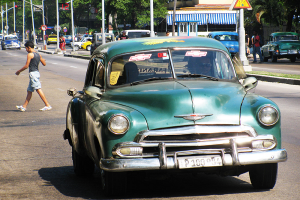
HAVANA, Cuba. — In 2010, Elvira was dismissed from her workplace. She had no option other than to get a license and open a snack-bar in her home in order to support her mother and son. She started selling coffee, soft drinks and sandwiches. She remarks that working for herself was more convenient, and she believed that she owed nothing to anyone because every month she duly paid her taxes.
Nevertheless, when she heard talk for the first time about the sworn statement about personal income as part of the “perfection” of the Cuban economic model, she never imagined what would happen to her: one fine day, they notified her that she owed nine thousand pesos national currency in debt to the tax authorities, and 500 in fines for fraud in her sworn statement, a total of 380 CUC [around $400 USD, close to two year’s average income in Cuba], hard currency and unattainable.
On inquiring at the Office of National Tax Administration (ONAT), the responses she received left her bewildered. According to the official, in order to monitor the sworn statement, they consider the work hours, quantity of products sold and their prices, as well as the place where the snack-bar is located. continue reading

Elvira asked how they could know all that, and the worker replied that the evaluation might be direct or indirect. “You may know that we observe you, but equally we have the option of evaluating you without your knowing.” And she added that if she did not agree, she could complain. Elvira, getting to her feet, told her: “I see now that you all get information from Aladdin’s Lamp.” Today she is thinking of turning in her license and working under the table, but first she must devise a way to pay the debt.
A carrier who did not want to reveal his name said that he turned in his license more than three months ago because “the streets are in a very bad state, and I barely earned enough to buy tires and fix the car.” In spite of that, a short while ago they notified him of a tax debt of 30 thousand pesos national currency, some 1,200 CUC.
One of the topics that lately has caused a commotion among the people is the great quantity of money the self-employed have to pay by way of taxes and fines.
Julio, an honest and enterprising neighbor, closed his private restaurant and turned in his license some time ago. He says that when the matter of the sworn statement about personal income began at the end of the year, he did not understand why, if all those months he paid 10% of his income, he had to pay again at year’s end.
“Marino Murillo said,” complains Julio, “that the payment to the tax system is to diminish the inequalities among the citizens. And I say what must be done for that is to take away privileges from the leaders, officials and their families, who are the ones who live well in this country, at the expense of Cubans.”
Cubanet, February 27, 2014, Gladys Linares
Translated by mlk.
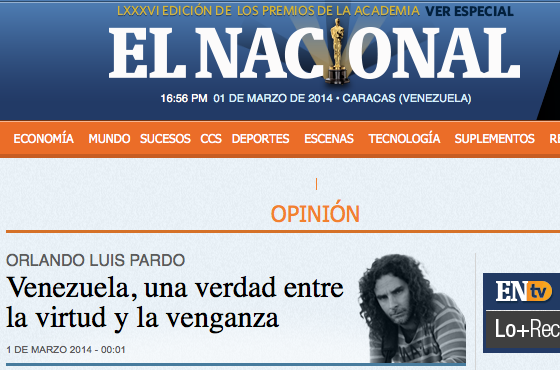 The Cuban people will go down in history as the people who most contributed to Latin American disintegration. Disguised by the ideological hatred of capitalism, we bit into the core of fratricidal hatred on our continent. This guilt today covers several generations, irreversibly anthropologically damaged. There is no forgiveness capable of freeing us from this criminal responsibility.
The Cuban people will go down in history as the people who most contributed to Latin American disintegration. Disguised by the ideological hatred of capitalism, we bit into the core of fratricidal hatred on our continent. This guilt today covers several generations, irreversibly anthropologically damaged. There is no forgiveness capable of freeing us from this criminal responsibility.
Since January 1959, a bourgeois and pro-democratic revolution, with strong hints of urban terrorism and a certain Cuban-style Protestantism, was re-channeled by Fidel Castro into an agrarian and anti-imperialist process, and ultimately turned into a dictatorship of the proletariat and an extreme alliance with Moscow in the context of the Cold War.
The United States did nothing to avoid the artificial radicalization of the Revolution. Rather, great arrogance and a touch of ignorance led to the victimhood with which we Cubans justify a regime of injustice and impunity: massive social programs but not for those human beings who weigh in with an opinion (whether for or against, discipline in the face of despotism was always the key to survival in times of revolution).
Thus, Castro took thousands and thousands of lives, not only of his opponents (many of them armed), but also of Cuban revolutionaries, the majority executed extra-judicially — many of them were tried after they were shot — as soon as they manifested the least symptom of dissent to the official totalitarian discourse. continue reading
Cuban society came unhinged within a few months. No press remained. No religion one could publicly confess. No independent education, only that imposed “for free” by the State. Nor was there personalized healthcare. Nor commercial brands. Nor “human rights,” a term that still today sounds like an insult within Cuba. All exchange of international currency was abolished. We could not leave nor enter the country. We could not connect by phone with the outside nor receive a letter without being fired from our jobs.
Those who could flee, fled. We are still fleeing. It is our permanent plebiscite before a government that never listened to its own people: flight as a reaction to asphyxiating Fidel-ity. Those who remained on the island shut up or went to prison with long sentences — and terribly cruel tortures — like those that made Nelson Mandela, for example, a global icon.
We non-Castroite Cubans never became icons of anything. We were simply “worms,” “traitors,” “scum,” the “lumpen” of the “first free territory in America.” In American academia, especially, where Castroism had been “politically correct” from the very beginning, the greatest Cuban intellectuals, like the exiled and ultimately suicidal Reinaldo Arenas, never found shelter.
Then we imposed death on Asia, Africa and the Americas. We tried to spark 1,959 Vietnams all over the planet, possibly with nuclear missiles installed in Cuba behind the backs of the Cuban people. We invaded sovereign nations like Venezuela, and forever traumatized the fragile democracies of the hemisphere in the interest of a violent seizure of power, in uprisings or false populist movements that implied the scaffold for class enemies.
Just around the time our failure was obvious, with the fall of the global Socialist Camp, we used the money from other genocidal powers — such as Libya, North Korea and Iran — to encourage the false socialist democracies of the 21st century. Finally, it’s now Venezuela’s turn. A country that for many decades has been on Cuba’s death row, as General Angel Vivas reminded us a few days ago from his besieged home.
The Venezuelan people slept, like so many in the region. And in addition, it was a nation that evolved in its incessant clamor for a more just social system and less political demagoguery; this sequel we’ve dragged with us in Latin America since independence only bequeathed to us its retrograde string of caudillos.
Free Cubans, in Cuba and in exile, deplored Hugo Chavez from before his triumphant election. We never believed in his cynical smile. We didn’t even trust his most transparent election. Cubans know that the butcher’s hand of Castro never fails. But the world labelled us, then, reactionaries, “Batistianos” (half a century after Batista), and “Washington’s mercenaries” (as, in effect, many of us had no choice, having lacked a country in perpetuity). And, still worse, they spat in our face the stigma of being the intestinal traitors of the universal cause of Revolution.
Today Venezuela has taken to the streets, it “has had enough and has begun to march,” to the scorn of Ernest “Ché” Guevara, Salvado Allende, and other victims of Castroism still not recognized as such. In Venezuela the exploding popular tide is not political, but rather one of founding resistance. There where dictators and democrats have failed, the Venezuelan people understood that they were looking at their last chance. The alternatives to Chavezism, with or without cancer, were becoming obvious to Venezuelans after a decade of decline: Castroism in perpetuity or Castroism in perpetuity. They would never escape this monolithic idiocy if they didn’t escape it now.
Venezuelans are a lovely and free people, as were Cubans. It is now that they have to break the chains of constitutional fatigue. The Castro regime has never before been in such danger of finally beginning to disappear, with or without octogenarian Castros dictating their death ordeals from an interred, inhuman Havana.
Your freedom is now or now, Venezuela, still miraculously alive in this terrible trance were even vengeance seems like a virtue.
1 March 2014, From El Nacional, Venezuela
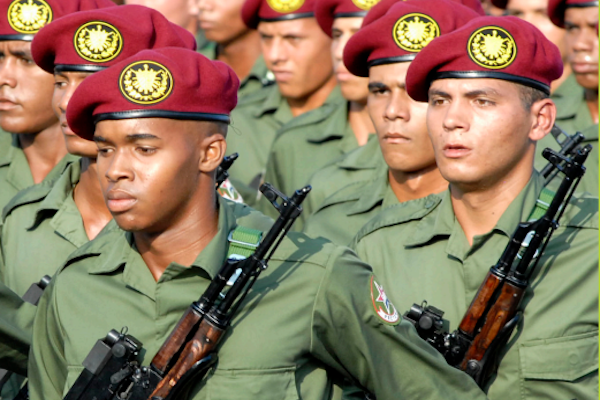
Cuba is not the same as 40 years ago, but its leaders are the same
HAVANA, Cuba, February — Cuba intervened militarily in Angola on the side of the MPLA in August of 1975. In 1977 Revolutionary Armed Forces (FAR) supported the government of Agostino Neto in order to suppress by blood and fire an internal rebellion.
After that moment, the Cuban government took in its hands, in a less surreptitious manner, control of Angola. Within the MPLA there were divergent opinions about the role the Cubans were playing in the country’s political situation. On the death of President Neto in 1979, they pulled strings for the appointment of Jose Eduardo DosSantos to the post.
“In 1978, Fidel Castro knew that he could not count on the USSR unconditionally,” says an ex-official connected to the Cuban embassy in Angola at that time, “and his plan B consisted of strengthening political and military control over Angola. The Russians involved themselves in the matter when they saw the possibility of trafficking arms in exchange for gold and precious stones. This the high Cuban officialdom did from the moment they gained control of the Angolan governmental entities and the main access roads into the country. The political and military caste that came into power in Russia post-1991, did it, too, with the money earned there and in other low intensity military conflicts.”
Now, in the case of Venezuela, the strategy is different but seeking the same objective. “Venezuela is not Angola, and Cuba is not the same as it was 40 years ago,” explains my interlocutor, “but the individuals in control are the same. They have sent civil collaborators like a screen to try to cloak their strong presence within the structures of all levels of that country. Chavez handed the house keys to the Cuban DGI (State Intelligence Directorate), and Maduro is a bad version of Jose Eduardo DosSantos.” continue reading
If the political situation in Venezuela goes completely out of control, the first victims would be the Cuban civil collaborators. “And in the same way as happened in 1977 when Nito Alves confronted Agostino Neto, it cannot be ruled out that FAR will intervene in Venezuela citing the protection of the collaborators.”
The question of how they will do it is more of form than of substance. But Angola was a country recently released from colonial domination, in contrast with Venezuela which possesses a democratic tradition that has shown itself to be persistent. “Nevertheless the silence or complicity of the Latin-American countries with the abuses of the Burro from Miraflores is a bad sign.”
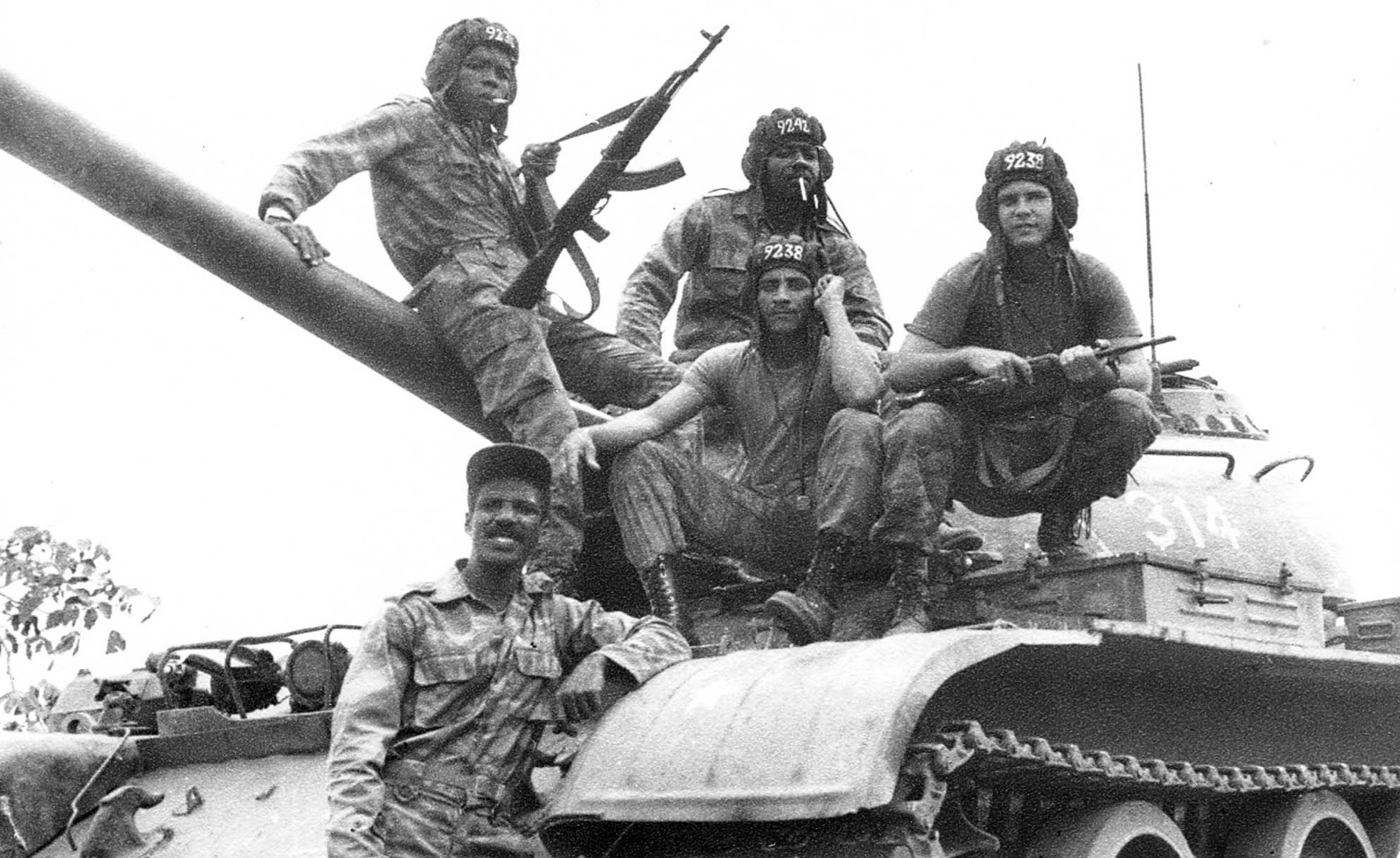
On the other hand, the government of Raul Castro is facing a difficult choice: “If the military intervention by Cuban troops generates a spiral of such violence that it involves massive deaths among the civilian Venezuelan population and Cubans, the political cost for Raul Castro would be very high within and outside of Cuba. The US government would hold all the cards in its favor to declare it a hemispheric plague. The Latin-American governments would have to take a clear position in the matter or public opinion would hold them to account.” And a possible dialog with the CEE would grind to a halt.
Towards the interior of Cuban, just look at the sad destiny that the African veterans suffer. My interlocutor said: “It is unlikely that a lightning political campaign of Raulism will gain the support of the island’s people for military intervention in Venezuela. At first, he will send elite troops trained in confronting disturbances in urban zones.”
In 1992 Fidel Castro declared that the era of Cuban military missions abroad had ended. Two decades later, the drums of another fratricidal war may be about to beat on the doors of the Cuban family. The worst scenario possible is not impossible.
Cubanet, February 28, 2014 / Camilo Ernesto Olivera Peidro
Translated by mlk

Havana, Cuba. – Professor Gloria Llopis Prendes, her daughter Gloria and her 3-year-old granddaughter Amanda, have received an Eviction Notice to vacate their current home located at Avenida 71 Edif. 3, Aprt 10, Zona de Desarrollo, Batabano, Mayabeque province, a community known as Las Casas de los Maestros (Teacher’s House).
How did you become aware of this Eviction Notice?
“On February 20th an official commission showed up at my home to give me an ultimatum, that I had only 15 days to go back to work, otherwise I would be considered an illegal occupant of the premises. Among the local officials were Julio Cesar Martinez, Director of the Ministry of Education (MINED) here in Batabano; Hildo Caballero, general secretary of the Communist Party (PCC) in the municipality; and a lady named Liset, head of the MINED Department of Inspectors in the municipality. I have no choice, if I refuse to vacate the house, all utilities will be cut off, the police will enforce the eviction notice and we’ll be homeless.
What is the basis for this eviction threat?
Our apartment is an asset of Ministry of Education. Once you don’t work for them anymore, you cannot be in possession of such asset. I have been working for the Ministry of Education since January 3, 1983, until two years ago when I was fired for becoming a peaceful dissident, a “crime” sufficient to cause you to lose your job.
Do you know someone who has been given such an ultimatum?
“Yes, Odalys Fernandez Quesada, History professor, received a similar notification from the same Commission. Odalys is member of the NGO Zero Violence Feminine Platform, of which I am the Coordinator, and associated with the NGO Nuevo Pais (New Country) Forum, presided over by Dr. Manuel Cuesta-Morua. continue reading
Cuesta-Morua is your husband. What is his legal status?
“Manuel is on probation now. He has to go once a week to a Police Station located at Septima y 62, Miramar, Municipio Playa. He was imprisoned some days before the CELAC Summit in Havana for daring to call a parallel convention which did not take place because the government obstructed it. They charged him with “Disseminating False News against World Peace.”
Do you know any other former employee of Ministry of Education in possession of housing that belongs to the Ministry?
“Yes, many. When the Escuelas en el Campo (schools in the countryside) idea failed, some employees went to work in different fields, others took clerical jobs, others were promoted to political or administrative positions, always keeping the roofs over their heads.
“The same thing happens with all the housing that belongs to any government entity. Officials look the other way, they never review the lease as long as the employee continues working for the government*. Whoever is in possession of an asset is tied for life to government entities. Years ago apartment buildings were built in the countryside for those teachers who were permanently working in middle schools and high schools in those areas.”
Gloria Llopis holds a BA History and Social Sience 1983 and a BA Psychology and Pedagogy 1989
*Translator’s note: Since the vast majority of jobs in Cuba are in State entities, this covers most working people.
Cubanet, 28th of February, 2014 Reinaldo Emilio Cosano Alen
Translated by: Rafa

Havana, Cuba, February 2014 – Last week disturbing news circulated throughout the Cuban dissident community: The top permanent body of the National Organization of Collective Law Firms (ONBC) suspended Amelia Rodríguez Cala—the great defender of accused opponents of the regime—from practicing law for a period of six months.
As the days passed, additional details about the clumsy maneuver surfaced. It became clear that, although they invoked other reasons, what is at the heart of this new hoax is the aim of punishing this learned woman because of her upright stand in the exercise of her profession.
As usual, other pretexts are deployed. They initiated disciplinary proceedings against Amelia based on alleged complaints from two clients. At this point, it is reasonable to suspect that at least one of them is a provocateur in the service of the regime. In any case, a cursory examination of the two complaints demonstrates the weakness of the allegations.
In the case of Caridad Chacón Feraudy, it is claimed that the attorney did not submit her evidence in time. Never mind that a technical assistant breached her obligation of notifying and informing the lawyer about the matter. Nor that Amelia ultimately won the case, as the evidence was presented to better purpose, and accepted and used by the Court. continue reading
For her part, Regla Capote Alayo claims that there was no notification to the firm to report the judgment in her case. In this regard, the same lawyer exhibits the documents showing she met with that woman no less than ten times, without the woman giving her the courtesy of bringing this up.
Anyone examining the matter impartially would conclude that Dr. Rodríguez Cala should be exonerated. But the outcome was otherwise, and to ask for objectivity from the ONBC leaders is like expecting mangoes from a pine tree. What has now been decided against Amelia is just the latest link in a long chain of constant acts of harassment against her.
We know of the constant harassment that the leaders of the Carlos III Collective Law Firm have maintained against the jurist. In this, the unit director, Ileana Sandoval Roldán, and the team leader Franklyn Menéndez Tamayo, have distinguished themselves.
They have made her life impossible. In haphazard fashion they constantly question her about supposed deficiencies in her work. This has been repeated in the presence of several different clients, who can attest to the despotic and abusive way that the leaders of that law firm treat the attorney. This is no accident.
Rodríguez Cala has defended over a hundred dissidents. At the time she was excluded from her professional practice, she was representing almost all the independent personalities who are today involved in court cases: Berta Soler, Martha Beatriz Roque, Sonia Garro, Ramón Muñoz, Ángel Santiesteban, Marcelino Abreu Bonora, Reinier Mulet, Miguel Ulloa Guinart Angel Yunier Remon, Gorki Águila.
This reality is what arouses the hatred and ferocity of the mediocre, for whom the barrister’s robe is nothing more than another kind of uniform. In their lawlessness, the repressors from the collective law firms have even exceeded their powers. Decree-Law 81, which regulates the practice of law, empowers them to apply to a member of the organization, among other sanctions, that of “transfer to another position of inferior category or, after proper coordination, to another unit nearby.”
The disjunctive conjunction indicates that they can choose between the two penalties: either give you a lower position, or transfer you to another firm (implying, to work there as a lawyer). In this case, in violation of the law, both measures were applied. As for “nearby,” you only have to realize that they sent her to the distant town of La Lisa.
This week, the attorney plans to fulfill her unjust sanction. In her new position she will earn 300 Cuban pesos per month, just over $12. They want to silence her voice, but her honesty and pure love for the profession place her far above all these dirty tricks. Will she be able to work in La Lisa without difficulties, or should we expect more provocations and acts of harassment against her?
We’re waiting on the outcome of her situation. Also that of the political prisoners, whose defense, it seems, the regime wants now to be assumed by the docile lawyers that these same “leaders” of the firm have chosen. As for Amelia, I’ll keep myself informed, not only because she is a colleague who has worn the robe with dignity, but also—and now on a more personal level—because she was my advocate during my second political imprisonment.
Cubanet, 25 February 2014, René Gómez Manzano
Translated by Tomás A. and José S.
My country is so devoid of citizen initiatives, citizens live convinced that the “citizen” itself is a pejorative and almost criminal term used by the police, so how can they imagine that the word is not only beautiful, but that it has erotic overtones: the citizen-sovereign is he who elects his representatives and removes then if he is not served by them. In this “democracy” that we suffer we have managed to reverse the terms, so these “whatever” slogans and others in disuse lacking a rhythm and the name of the actual leader come into play.
And so, sick to death of these ever repeating slogans, the ailing citizen continues on not knowing who he is, braving the incessant drip of problems that define his life, where he is a victim, hero, anonymous or villain; not understanding, submerged in the everyday, that he will be the star of the democratic transition.
Standing in front of a shop window, looking in a mirror, or facing an abuse of power, the citizen ends up realizing who he is.
Between the cryptic and the serious, I wanted to greet the appearance of the Constitutional Roadmap, which is complementary to the Campaign for the signing of the UN Covenants (without tarnishing other proposals I don’t know of or that don’t interest me: more is better) they seem to me to be good fertilizer for the citizen-in-waiting.
26 February 2014